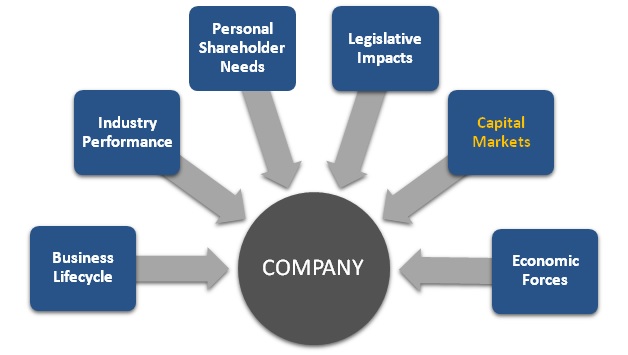How External Market Factors Drive Your Company’s Valuation
By: Wesley Legg, Chief Operating Officer
“I should have sold when I had the chance,” is a phrase our advisors hear much more often than “I sold too early.”
Timing a transaction is tricky, because it’s influenced by a variety of internal and external factors, such as:
- Government policy
- Capital markets
- Macro-economic forces
- Industry life-cycles
- The company’s life-cycle
- Personal needs and desires of the owner
Each one of these factors is important to consider, but credit markets have historically proven to be one of the most powerful external force in both inflating and deflating valuations. There are two reasons why.
Rate of Return
In the world of investing, return is commensurate with risk. The greater the risk, the higher the need for return. Economic risk is measured by determining the rate of return required for an equivalent investment facing an equivalent level of risk. This rate of return is called the “discount rate”. The capital used to buy a company is typically a combination of debt and equity. Equity can be in the form of either company stock or cash, and debt is borrowed money the acquiring firm/company pays interest on. Each source of funds is obtained at a different cost, so the “weighted average cost of capital” is used to determining the discount rate. As interest rates go down, present values go up, making valuations higher. A small change in the discount rate can result in large changes in valuation. Summed up simply, when paying higher interest rates, the investor requires a higher rate of return, which makes valuations go down, and vice versa.
Money Supply
Money supply also heavily influences business valuations. When the economy sputters, the fed lowers interest rates to stimulate the economy. When money is cheap and the economy bottoms out, capital markets begin to loosen the purse strings. Early investors buy cheap, but more money competing for a limited number of assets drives valuations higher, and investors, emboldened by their access to debt, and lower discount rates, start to take on more risk. Early investors start to see good returns and those on the sidelines, not wanting to miss out, come in to drive valuations even higher. Sometimes, fundamentals yield to speculation and for a period “the sky is the limit.” But then, fundamentals return, company’s default on their debt, capital markets get scared and stop lending, and in a small fraction of the time it took to inflate, asset values crater.
While you might not be able to top tick the market, studying history and tracking current trends can reveal your narrow window of opportunity. Want to know where we are in the current credit cycle? Read this.
Founders Investment Banking (Founders) is a merger, acquisition & strategic advisory firm serving middle-market companies. Founders’ focus is on oil and gas, industrials, software, internet, digital media and healthcare companies located nationwide, as well as companies based in the Southeast across a variety of industries. Founders’ skilled professionals, proven expertise and process-based solutions help companies access growth capital, make acquisitions, and/or prepare for and execute liquidity events to achieve specific financial goals. In order to assist Founders Investment Banking with securities related transactions certain Principals are registered investment banking agents of M&A Securities Group, Inc., member FINRA/SiPC. M&A Securities Group and Founders are not affiliated entities. For more information, visit www.foundersib.com.
